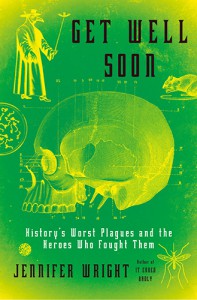WhiskeyintheJar Romance
Romance book talk, reviews, recipes, and dog pictures
Blogger Site: WhiskeyintheJar Romance
Guest Reviewer at: Reading Between the Wines book club
Kyraryker’s quotes
50%

Leprosy
Leprosy is a bacterial disease, caused by Mycobacterium leprae. The Norwegian doctor Gerhard Hansen identified the bacterial cause in 1873, and the disease today is often called Hansen’s disease.
Leprosy is one that current generations probably have more of an inkling about because of the term "Leper" and how it is used to describe an undesirable person. This is one that I thought the author went further into depth, in relation to the other plagues discussed, about what causes it, how it affects the body, and who helped fight it, along with her usual social focus.
The most notable feature of leprosy—and in many cases the first symptom of the disease—is the loss of the sense of touch.
How horrifying, thinking about not being able to feel a cut on your foot or hand, then having it get infected seems like such an awful seemingly innocuous symptom that manifests to a major problem. When I think about lepers, most of my imagery comes from few historical photos and how movies/tv shows choose to depict them, the wrapped hands and feet make more sense.
But Damien is a reminder that you don’t have to be a genius or a brilliant scientist or a doctor to help in this war against disease: you just have to be someone who gives a damn about your fellow man.
I did not know about Damien and only faintly remember hearing about the leper island of Molokai. His decision to stay on the island and care for the inhabitants so intimately is completely commendable and makes me think a bit reckless in regards to own health.
Typhoid
At the turn of the century, if untreated, the disease resulted in death about 60 percent of the time. Today, antibiotics reduce the risk of fatality to almost zero.
Another Oregon Trail villain!
The Sherlock Holmes figure in this case was a sanitation engineer named George A. Soper.
Like with lepers, most people have heard of "Typhoid Mary" or know what the phrase means. I had never learned about George A. Soper before and reading a synopsis of how he tracked down Mary as the source of typhoid breakouts was interesting and I'll probably see if I can find a book on him.
Mary herself was an interesting character, her forced confinement was hard to read about, just as her decision to change her name after released and work in a hospital, knowingly infecting more people.
Even with these interesting people I was more excited to see Dr. Sara Josephine Baker discussed and someone I have read about and I think doesn't get read about enough. Reading about how she sat on Mary to force her to stay in the car to bring in for testing, makes you think about what a sight that would have been.
Really, though, this section to me was all about WASH YOUR HANDS.
Spanish Flu
By 1918, 35 percent of people dying from influenza were in their twenties.
The healthiest population dying at 35%, frightening. The author did a good job again talking about symptoms and how the disease overwhelms the immune system and triggers a cytokine storm, which is basically too many immune cells flooding to a part of your body that causes the problem. Interesting stuff but like the wash your hands dominating the last chapter, this one was dominated by the author talking about the government didn't want to start a panic so they were putting restrictions on what newspapers could print about it.
In all likelihood, the Spanish flu was an all-American plague hailing from Haskell, Kansas.
I'm not sure the veracity of this comment, "in all likelihood" has a lot of wiggle room, but what a discussion a classroom could have about the how and why it is called the Spanish Flu instead of the Kansas Flu. A discussion that involves World War 1, Spain's neutrality, censorship, patriotism, and plenty more.








 5
5
 4
4